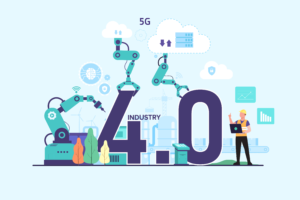Exploring the Intersection of Industry 4.0 and 5G

 As you read the title, I’m sure you have heard these words from a blog or talk before. I bet they feel like the latest series of buzzwords. After reading this article, you will become more familiar with these terms and prove that these are not just empty buzzwords. Industry 4.0 and 5G are two innovative technological advancements that have the potential to change the way we live and work. Industry 4.0 refers to the fourth industrial revolution and is characterised by integrating advanced technologies such as artificial intelligence, the Internet of Things (IoT), and robotics into traditional manufacturing and industrial processes. 5G, on the other hand, is the fifth generation of mobile networks that promises to provide faster and more reliable communication than previous generations.
As you read the title, I’m sure you have heard these words from a blog or talk before. I bet they feel like the latest series of buzzwords. After reading this article, you will become more familiar with these terms and prove that these are not just empty buzzwords. Industry 4.0 and 5G are two innovative technological advancements that have the potential to change the way we live and work. Industry 4.0 refers to the fourth industrial revolution and is characterised by integrating advanced technologies such as artificial intelligence, the Internet of Things (IoT), and robotics into traditional manufacturing and industrial processes. 5G, on the other hand, is the fifth generation of mobile networks that promises to provide faster and more reliable communication than previous generations.
Industry 4.0 has the potential to revolutionize manufacturing and production processes by integrating IoT, advanced sensors, and AI. This leads to improved production speed, reduced costs, and increased competitiveness. In addition, Industry 4.0 enables companies to collect and analyse vast amounts of data, which can be used to improve the quality of their products and services. With the use of robotics and automation in the production process, highly automated factories can operate with minimal human intervention, 24/7, leading to increased productivity, improved quality, and reduced costs.
The integration of IoT in Industry 4.0 allows for the creation of smart factories, where machines and devices are equipped with real-time sensors that collect and transmit data. This data can then be analysed using AI algorithms, which can optimize production processes, improve quality, and reduce downtime. Furthermore, the use of advanced digital technologies such as 3D printing, augmented and virtual reality, and cloud computing can help companies design, test, and produce products more efficiently and cost-effectively. Despite the potential loss of jobs due to automation and the need for workers to adapt to new technologies and skills, Industry 4.0 is expected to significantly impact the global economy and how we live and work.
5G provides faster and more reliable communication, which is crucial for the successful implementation of Industry 4.0. With 5G, manufacturers can communicate with their machines and devices in real-time, allowing for improved monitoring, control, and automation of the production process. This can lead to increased efficiency and enhanced productivity. The key benefits of 5G include increased speed, reduced latency, and improved capacity, allowing for the connection of many devices simultaneously. This enhanced capacity will be crucial for successfully implementing the Internet of Things (IoT), as it will allow for the connection of millions of devices, from smart homes to industrial equipment. It has the potential to revolutionise industries such as healthcare, education, and entertainment, allowing for the creation of new products and services that were previously not possible.
5G is a significant technological advancement that has the potential to impact the way we live and work. However, it also raises some concerns, such as the need for substantial investments in infrastructure and the potential for security and privacy issues. Despite these challenges, 5G is expected to significantly impact the global economy and provide new opportunities for innovation and growth.
In conclusion, Industry 4.0 and 5G are two technological advancements that can change the way we live and work. Industry 4.0 has the potential to revolutionize manufacturing and production processes, leading to increased efficiency, improved quality, and reduced costs. With the help of 5G, manufacturers can communicate with their machines and devices in real-time, leading to improved monitoring, control, and automation of the production process. Despite the potential challenges associated with these advancements, such as the loss of jobs due to automation, Industry 4.0 and 5G are expected to significantly impact the global economy and how we live and work.
At Zinkworks we have created a product called Networked Device Orchestrator (NDO) which is purpose-built for Industry 4.0. It is designed to enable the orchestration of connected equipment, predicting and avoiding demand spikes before they impact the network, and empowering enterprise users to align their internal business rules to the available network capacity. Learn more: www.zinkworks.com/solutions/
Written by Aaron Fortune.
